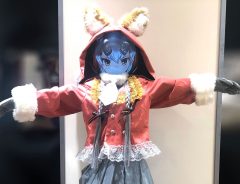
Source: PR Times
Kyoto-based company develops the world’s first audio metaverse platform, an inclusive digital space for all
- Tags:
- Apps / Audio / metaverse / Technology / VR
Related Article
-

Cyberpunk Sake Cup “HOLOYoi Masu” Projects Hologram Images In Your Sake, Plays Music
-

Cat paw electric pocket warmers let you fight the cold and squish toe beans at the same time
-

Miss Going Out? Why Not Take a Stroll Through the Virtual Market?
-

As Shuri Castle undergoes reconstruction, a virtual version debuts on Virtual OKINAWA
-

[Report] Meet, shake hands and hug a Vtuber!? Robot technology is making dreams come true
-

World’s First Official Neko-Atsume Store Is Limited Time Only, But Has Such Adorable Goods


With the majority of the world having been put on hold over the last two years, people have found the drive to pursue a more digital existence. This motivation has ultimately led to the launch of a variety of ways to enjoy virtuality, such as with VR technology, cryptocurrencies and the expansion of the metaverse.
Now, I won’t go into too much detail about the metaverse itself, but for those who are reading the word for the first time think of it as a network of interconnected virtual worlds developed for social interaction.
So far, the majority of these metaverse technologies have been focussed on visual elements, which, for a world that revolves around networking and being “accessible to all”, ironically emphasises it’s faults when it comes down to all-around inclusiveness.
In recognition of this issue, Kyoto-based Dokidoki Co., Ltd. – the company behind live streaming audio app Dabel – has stepped up to the task of creating an audio metaverse platform that is intended to break down the boundaries currently felt in the digital realm.
Presently in the beta testing stage, this new audio metaverse platform is called Cubemint.
Dokidoki Co., Ltd. claims that Cubemint came into being thanks to the users of their live streaming audio app Dabel. Through surveying, the company detected that many of these users are visually impaired or sensitive to visual stimuli, and developed an app and basis for a metaverse platform that is not affected by these barriers, instead overcoming them and successfully creating a digital social world that is accessible to all.
CEO and founder Takahito Iguchi explains; “One of the biggest challenges the Metaverse is currently facing is inclusiveness and accessibility. Considering this, we aim to make Cubemint an audio metaverse space that everyone can access, and ultimately eliminate the loneliness and isolation of humankind, by leveraging our experience in product development with our users.”
The biggest advantage of an audio metaverse platform is that it can act as a bridge to extend physical reality, and it can also connect remote users in the virtual realm without needing them to enter a completely different world.
As another plus, the only necessity is a set of wireless earphones. This makes entering the audio metaverse relatively easy in comparison to other metaverse platforms that often require additional and somewhat expensive equipment.
Cubemint is currently in a beta testing stage, with key people such as sound designers and users who are visually impaired working together to raise it to a level that meets the company's inclusive vision of what the Audio Metaverse should be.